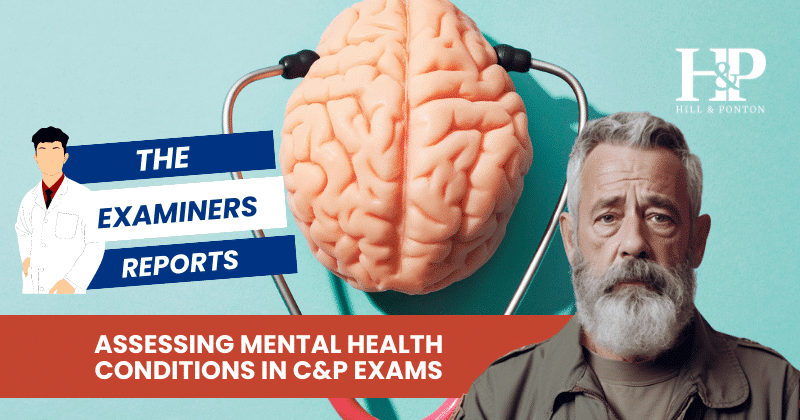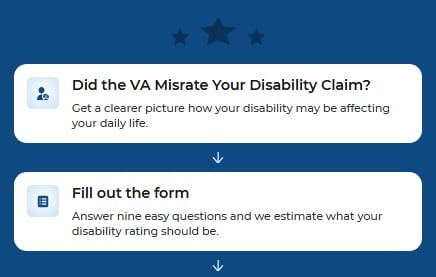VA ratings for mental health disorders like PTSD, depression or anxiety follow specific criteria based on how they affect your daily life and ability to work. Our collection of guides, tools, and expert advice can help you navigate the VA claims process, understand potential rating changes, and access the benefits you’ve rightfully earned.
Whether you’re filing your first claim, appealing an unfavorable decision, or looking to increase your current mental health rating, you’ll find below all the information you need for the next step on your road to VA disability compensation.
Resources for Veterans

The Veteran’s PTSD Guide
A complete, easy-to-understand guide to getting VA compensation and assistance for PTSD.

Suicide Risk and Prevention
Veteran suicide statistics, risk factors and resources for veterans, their families and friends.

C&P Exams for Mental Disorders
A VA medical examiner explains mental health C&P exams and how to best prepare for them.

Mental Health Rating Tool
This will help you understand if the VA may have assigned the wrong rating to your mental disorder.
VA’s General Rating Formula for Mental Disorders
The VA assigns mental health ratings ranging from 0% (for symptoms that don’t interfere with occupational and social functioning and don’t require continuous medication) to 100% for total impairment, according to the criteria in the General Rating Formula for Mental Disorders in the VA’s schedule of ratings.
| Rating | General Rating Formula for Mental Disorders |
|---|---|
| 100% | Total occupational and social impairment, due to such symptoms as: gross impairment in thought processes or communication; persistent delusions or hallucinations; grossly inappropriate behavior; persistent danger of hurting self or others; intermittent inability to perform activities of daily living (including maintenance of minimal personal hygiene); disorientation to time or place; memory loss for names of close relatives, own occupation, or own name. |
| 70% | Occupational and social impairment, with deficiencies in most areas, such as work, school, family relations, judgment, thinking, or mood, due to such symptoms as: suicidal ideation, obsessional rituals which interfere with routine activities; speech intermittently illogical, obscure, or irrelevant; near-continuous panic or depression affecting the ability to function independently, appropriately and effectively; impaired impulse control (such as unprovoked irritability with periods of violence); spatial disorientation; neglect of personal appearance and hygiene; difficulty in adapting to stressful circumstances (including work or a work-like setting); inability to establish and maintain effective relationships |
| 50% | Occupational and social impairment with reduced reliability and productivity due to such symptoms as: flattened affect; circumstantial, circumlocutory, or stereotyped speech; panic attacks more than once a week; difficulty in understanding complex commands; impairment of short – and long-term memory (e.g., retention of only highly learned material, forgetting to complete tasks); impaired judgment; impaired abstract thinking; disturbances of motivation and mood; difficulty in establishing and maintaining effective work and social relationships. |
| 30% | Occupational and social impairment with occasional decrease in work efficiency and intermittent periods of inability to perform occupational tasks (although generally functioning satisfactorily, with routine behavior, self-care, and conversation normal), due to such symptoms as: depressed mood, anxiety, suspiciousness, panic attacks (weekly or less often), chronic sleep impairment, mild memory loss (such as forgetting names, directions, recent events). |
| 10% | Occupational and social impairment due to mild or transient symptoms which decrease work efficiency and ability to perform occupational tasks only during periods of significant stress, or symptoms controlled by continuous medication |
| 0% | A mental condition has been formally diagnosed, but symptoms are not severe enough either to interfere with occupational and social functioning or to require continuous medication. |
This General Rating Formula for Mental Disorders is used for all mental health conditions with the exception of eating disorders which have their own criteria. So whether your disability is PTSD, Adjustment Disorder, Anxiety, or Depression, the VA rates all of these disabilities on the same rating schedule, looking at the same range of symptoms.
The use of the general formula is often beneficial to a veteran being treated by multiple doctors, who may assign different diagnoses to complex psychological issues. It’s also important to know that a veteran need not suffer from every symptom listed. The VA is supposed to look at all of the veteran’s symptoms and determine into which category he or she most closely fits. A veteran should make sure to report all of the symptoms experienced, whether they are on the list or not, so that VA can appropriately consider the veteran’s entire mental disability picture when assigning a rating.
Mental Health VA Disability Claims
VA attorneys Matthew Hill and Carol Ponton explain how to correctly claim a VA disability rating for a mental health condition:
If you need help with a VA mental health claim, Matthew Hill has written THE book on how to prepare (and win!) your VA claim. Get The Road to VA Compensation Benefits for free as an ebook or in print.
Top 10 Mental Health VA Disability Rating Tips for Veterans
As a veteran with a mental health disorder, navigating the process of applying for VA disability benefits can be complex and challenging. We’ve compiled a list of 10 essential tips to help you and increase your chances of receiving the benefits you deserve.
- Understand the Importance of Mental Health: Recognize that mental health disorders, such as post-traumatic stress disorder and depression, are real and valid conditions that can be eligible for VA disability benefits. Seek proper diagnosis and treatment from qualified professionals.
- Keep Detailed Records: Keep detailed records of your mental health condition, including symptoms, triggers, and limitations. These records will help you provide accurate and compelling evidence to support your claim.
- Connect Your Mental Health to Your Service: Make sure to establish a clear connection between your mental health condition and your military service. Provide specific details about the events or incidents that may have caused or aggravated your mental health disorder during your service.
- Describe the Impact on Your Daily Life: Clearly articulate how your mental health condition affects your daily life, including your ability to work, perform daily activities, and maintain relationships. Be honest and detailed in describing the impact of your mental health disorder on your overall well-being.
- Seek Buddy Statements: Obtain buddy statements from fellow service members, friends, or family members who can provide firsthand accounts of how your mental health condition has affected you. These statements can serve as compelling evidence to support your claim.
- Attend All Mental Health Exams: Be sure to attend all mental health examinations scheduled by the VA. These exams are an essential part of the claims process and can provide valuable medical evidence to support your claim.
- Provide Complete and Accurate Information: When completing your application and attending exams, provide complete and accurate information about your mental health condition. Avoid downplaying or omitting symptoms, as this could negatively impact your claim.
- Seek Help from a Qualified VSO or Attorney: Consider seeking assistance from a qualified Veterans Service Organization (VSO) or a VA-accredited attorney specialized in PTSD and other mental health disorders. These experts can provide guidance and advocacy throughout the claims process.
- Be Patient and Persistent: The VA disability claims process for mental health disorders can be complex and lengthy. Be patient and persistent, and don’t give up if your claim is denied initially. Take advantage of the appeals process and provide additional evidence to support your claim.
- Take Care of Your Mental Health: Lastly, prioritize self-care and seek treatment for your mental health condition. Taking care of your mental health is not only essential for your overall well-being but can also strengthen your claim for VA disability benefits by demonstrating ongoing treatment and management of your condition.
Proposed Changes in Mental Ratings
(Not Yet In Place)
There is a proposal to change the rating criteria for mental health conditions, which could result in higher ratings for veterans with severe symptoms. The VA also aims to streamline the claims process for mental health conditions, making it quicker and easier for veterans to access benefits and treatment. 2025 update: these changes are not yet in effect and it is not clear when or if the VA will apply them.
If the new rating system is applied, instead of just looking at how your mental health affects your work and social life, the VA will look at five specific areas:
- Thinking and Understanding: Your memory, concentration, decision-making, and problem-solving
- Getting Along with Others: How you interact with people in social settings and at work
- Completing Tasks: Your ability to handle work, education, and daily chores
- Moving Around: Your ability to leave home, use transportation, and navigate different places
- Taking Care of Yourself: Things like hygiene, dressing, and eating properly
For each of these five areas, the VA will look at how severe your problems are (none, mild, moderate, severe, or total) and how often they happen (less than 25% of the time or 25% and more).
These two factors will give you a score from 0-4 in each area. Your final disability rating (10%, 30%, 50%, 70%, or 100%) will depend on how many areas are affected and how badly. It should make it possible to get the highest ratings even if only one area has total impairment.
Keep Up with the VA: We’ll Let You Know When Rating Criteria Change
Stay updated